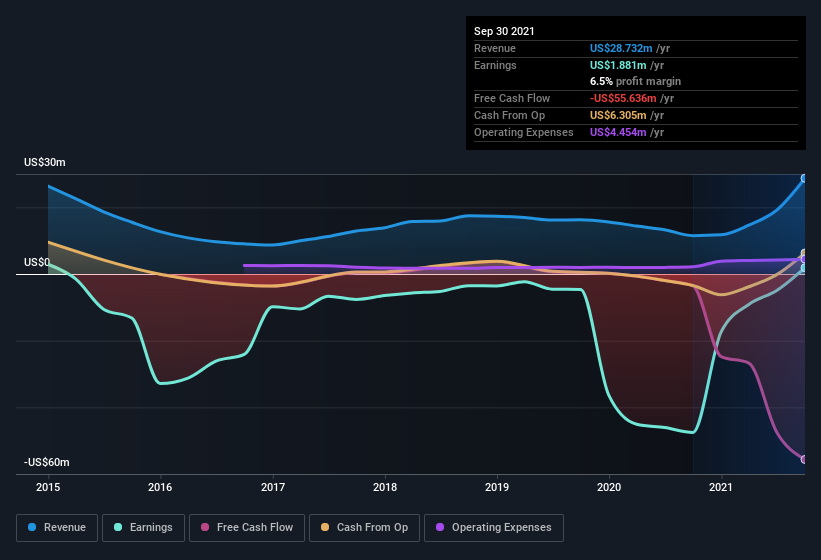- United States
- /
- Marine and Shipping
- /
- NasdaqCM:GLBS
Globus Maritime's (NASDAQ:GLBS) Earnings Aren't As Good As They Appear

Even though Globus Maritime Limited (NASDAQ:GLBS) posted strong earnings recently, the stock hasn't reacted in a large way. We looked deeper into the numbers and found that shareholders might be concerned with some underlying weaknesses.
View our latest analysis for Globus Maritime

A Closer Look At Globus Maritime's Earnings
As finance nerds would already know, the accrual ratio from cashflow is a key measure for assessing how well a company's free cash flow (FCF) matches its profit. To get the accrual ratio we first subtract FCF from profit for a period, and then divide that number by the average operating assets for the period. The ratio shows us how much a company's profit exceeds its FCF.
As a result, a negative accrual ratio is a positive for the company, and a positive accrual ratio is a negative. While having an accrual ratio above zero is of little concern, we do think it's worth noting when a company has a relatively high accrual ratio. Notably, there is some academic evidence that suggests that a high accrual ratio is a bad sign for near-term profits, generally speaking.
Globus Maritime has an accrual ratio of 0.78 for the year to September 2021. As a general rule, that bodes poorly for future profitability. To wit, the company did not generate one whit of free cashflow in that time. Even though it reported a profit of US$1.88m, a look at free cash flow indicates it actually burnt through US$56m in the last year. Coming off the back of negative free cash flow last year, we imagine some shareholders might wonder if its cash burn of US$56m, this year, indicates high risk. Notably, the company has issued new shares, thus diluting existing shareholders and reducing their share of future earnings. One positive for Globus Maritime shareholders is that it's accrual ratio was significantly better last year, providing reason to believe that it may return to stronger cash conversion in the future. Shareholders should look for improved cashflow relative to profit in the current year, if that is indeed the case.
That might leave you wondering what analysts are forecasting in terms of future profitability. Luckily, you can click here to see an interactive graph depicting future profitability, based on their estimates.
In order to understand the potential for per share returns, it is essential to consider how much a company is diluting shareholders. As it happens, Globus Maritime issued 1,071% more new shares over the last year. Therefore, each share now receives a smaller portion of profit. To celebrate net income while ignoring dilution is like rejoicing because you have a single slice of a larger pizza, but ignoring the fact that the pizza is now cut into many more slices. You can see a chart of Globus Maritime's EPS by clicking here.
How Is Dilution Impacting Globus Maritime's Earnings Per Share? (EPS)
Three years ago, Globus Maritime lost money. Zooming in to the last year, we still can't talk about growth rates coherently, since it made a loss last year. But mathematics aside, it is always good to see when a formerly unprofitable business come good (though we accept profit would have been higher if dilution had not been required). So you can see that the dilution has had a fairly significant impact on shareholders.
In the long term, if Globus Maritime's earnings per share can increase, then the share price should too. However, if its profit increases while its earnings per share stay flat (or even fall) then shareholders might not see much benefit. For that reason, you could say that EPS is more important that net income in the long run, assuming the goal is to assess whether a company's share price might grow.
Our Take On Globus Maritime's Profit Performance
As it turns out, Globus Maritime couldn't match its profit with cashflow and its dilution means that shareholders own less of the company than the did before (unless they bought more shares). On reflection, the above-mentioned factors give us the strong impression that Globus Maritime'sunderlying earnings power is not as good as it might seem, based on the statutory profit numbers. So while earnings quality is important, it's equally important to consider the risks facing Globus Maritime at this point in time. To that end, you should learn about the 4 warning signs we've spotted with Globus Maritime (including 2 which are potentially serious).
Our examination of Globus Maritime has focussed on certain factors that can make its earnings look better than they are. And, on that basis, we are somewhat skeptical. But there are plenty of other ways to inform your opinion of a company. For example, many people consider a high return on equity as an indication of favorable business economics, while others like to 'follow the money' and search out stocks that insiders are buying. While it might take a little research on your behalf, you may find this free collection of companies boasting high return on equity, or this list of stocks that insiders are buying to be useful.
New: Manage All Your Stock Portfolios in One Place
We've created the ultimate portfolio companion for stock investors, and it's free.
• Connect an unlimited number of Portfolios and see your total in one currency
• Be alerted to new Warning Signs or Risks via email or mobile
• Track the Fair Value of your stocks
Have feedback on this article? Concerned about the content? Get in touch with us directly. Alternatively, email editorial-team (at) simplywallst.com.
This article by Simply Wall St is general in nature. We provide commentary based on historical data and analyst forecasts only using an unbiased methodology and our articles are not intended to be financial advice. It does not constitute a recommendation to buy or sell any stock, and does not take account of your objectives, or your financial situation. We aim to bring you long-term focused analysis driven by fundamental data. Note that our analysis may not factor in the latest price-sensitive company announcements or qualitative material. Simply Wall St has no position in any stocks mentioned.
About NasdaqCM:GLBS
Globus Maritime
An integrated dry bulk shipping company, provides marine transportation services worldwide.
High growth potential with proven track record.
Similar Companies
Market Insights
Community Narratives




